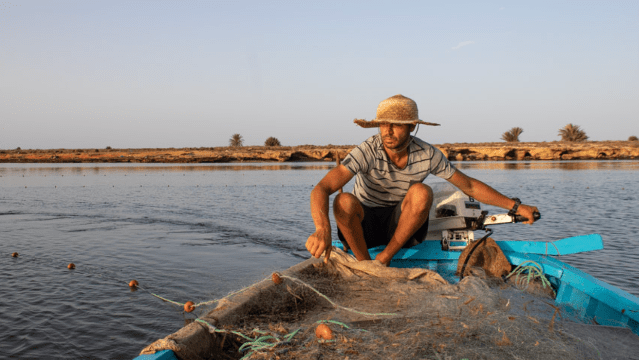27/04/2024, London UK
“Let’s think” Breakfast Club
Littoral conservation: a thought
The day after is day where Tunisia is really the “Green Tunisia”, تونس الخضراء.
A day where nature has rebuilt a coral reef that goes from Tabarka to the Gulf of Gabes. Tourism is still a source of revenue, but it is not at the expense of ecology: quotas are set for the number of entries to the country, like in Bhutan, and preservation is the number one goal for the whole industry and the nation as well. Tunisians have all been trained throughout their education (from primary school nature classes to mandatory ecology internships after graduation) to respect nature, fauna and flora, which is a total part of the Tunisian identity. This new vision has curbed unemployment by the creation of jobs focused on conservation and sustainability as well as the rehabilitation of ancient local practices and every Tunisian feels responsible for the ecosystem.
This is a wonderful “day after” we all dreamed of when thinking together about what needed to be done to preserve the beautiful and rich coastline we have in Tunisia and which is starting to be irreversibly damaged by decades of pollution, expansive sea farming and industrial fishing – worrying forecasts of octopus and tuna extinction from the Tunisian waters by 2050!
Tunisia has signed the Biodiversity Convention and the Paris Agreement, which means there is already a national awareness of the importance of nature and sea conservation. Thus, here are the key takeaways from our chat:
- A first step is that of mapping the existent or needed infrastructure:
What charities or NGOs (EUCN, Nature Conservancy, WWF…) are working already in the region or could have an interest in expanding their preservation efforts in Tunisia? - What opportunities/funds/grants are available to sea preservation projects in the region?
- What knowledge does Tunisia have on the impact of its industrial/tourism/agricultural activities on the seaside: are there biology or economy research centres focusing on the subject? What local initiatives are already in place? Businesses that tackle the issue of pollution or protection of the sea life.
- Real impact comes from a long-term geopolitical strategy associated with private funding, rather than from only NGOs and volunteers’ efforts. Conservation needs to become a source of growth for the country as well as an answer to local economic problems. Like Belize, Tunisia could look at debt-for-nature swaps which would enable it to access affordable capital, comply with sea conservation missions and create a sustainable environment, source of development for ecotourism, ecological fishing and sea farming and preservation of local communities and jobs. Greece is the first country in the Mediterranean looking to replicate the Belize deal, but Tunisia can easily follow suit with a proper political drive. Private funds are available with green loans becoming trendy and a global drive to associate investments to ESG initiatives. Conseuqently the actual world context is favourable if Tunisia decides to engage in this plan.
- All comes down to education and knowledge, and therefore, after the landscape mapping, it is important to start raising awareness of the issues the country and its citizens could face if nothing is done. Sea conservation could appear like a luxury topic when economic crisis and inflation are hitting hard, but it is a crucial link in the chain and like in Belize, addressing it can result in relief and growth for the whole country. Seminars, TV and radio programs, and Ocean’s Day events about Tunisia’s sea life organised by charities, associations or schools can be the first action in bringing people from different backgrounds and experiences into talking and learning about how protecting the sea is directly linked to protecting their Tunisian way of life and their land.
Tunisia has all the tools to start its sea conservation and protection while building a sustainable economy and improving its citizens life. For that, local community initiatives and awareness efforts need to be met by a political ambition to look at the sea strategy as a whole and create a legal framework to attract funding and set a clear long-term program to build a new “blue” Tunisia, تونس الزرقاء.
Thank you Imene, Ramzi, Rym, Salma and Zohra for your thoughts.
Khansa Gharbi
Atuge UK

Commentaires0
Vous n'avez pas les droits pour lire ou ajouter un commentaire.
Articles suggérés



